Leading from the Isolated Lane
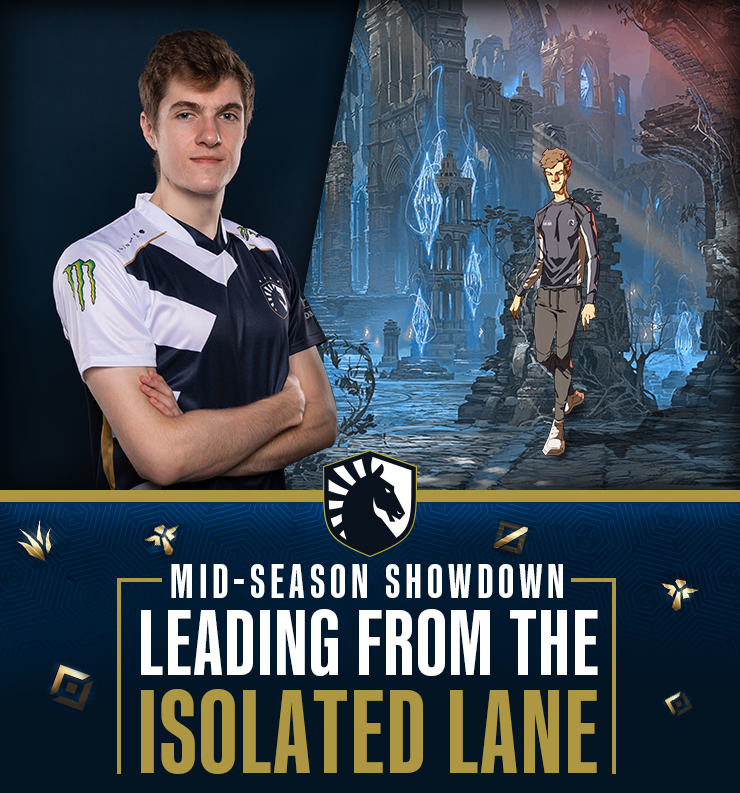
Moving Past the One Tap
In the average TL game, Alphari leads his lane opponent by 493 gold and 12.5 CS by 10 minutes. If you don’t know the numbers of League, this may not seem like much. To contextualize, Alphari’s 493 GD/10 is the highest the LCS has seen since the League began recording the stat in Spring 2014 and likely the best NA has ever seen. His CS/D is the second highest after Huni’s 13.1 when he and Reignover came over to NA as one of the best Jungle-Top duos in the West.
You go look at his whole career and the numbers become even more insane—not because Alphari hits higher peaks, but because of how long he’s stayed at this unrivalved lane-level. Alphari has led either the LEC or LCS in CSD/10 and GD/10 in 5 of the 9 splits he’s played.
Moving out from lane, Alphari has the highest damage stats this split, with 520 damage per minute and a 28.6% damage share on average. It’s not the first time he’s done this, getting the highest DPM and damage share in the 2020 LEC summer split and the 2nd highest DPM in Spring 2020 and Summer 2019.
At just 21 years old, Barney "Alphari" Morris is already one of the best top laners the West has ever seen.
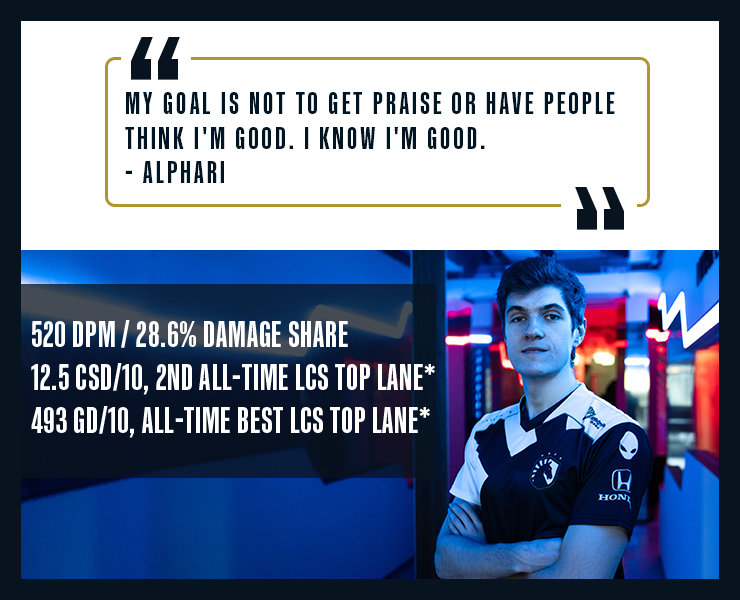
More dubiously, he has to be one of the best players in EU and NA who has yet to win a full split. Alphari is more keenly aware of this than anyone, to the point where praise and accolades are no objective for him.
“My goal is not to get praise or, I don’t know, have people think I’m good. I know I’m good,” he says in a flat, straightforward tone that’s signature to him by now. Very little pomp, very few things played up or down.
“I just want to win a split. I want to play against good players internationally. I want to see what I’m capable of. I want to win for myself. I actually don’t care about what other people think, I just want to be able to win for myself.”
Alphari’s trophy case isn’t empty. He just won the Lock-In tournament with TL this January and Europe’s regional and challenger leagues before this. What he’s lacking is that big win—the one that puts your team into international competition as a leader of your region. Much of his career is the process of building into that region-leading player. The laning is the foundation—and it’s one hell of a foundation.
Playing the solo game
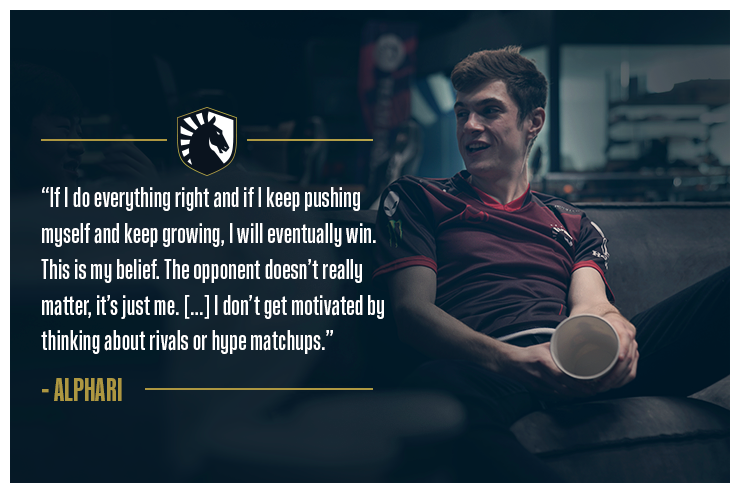
Fitting to a hard carry in League’s most isolated lane, most of Alphari’s motivation and belief stems from the self. He’s resolute that, even in a team game, he can control the outcome and can create the victories he’s looking for.
“The way I see it and the way I’ve seen it nearly the whole of my career is pretty much that it’s all in my control. It’s up to me whether I win or not. It’s up to whether I perform as well as I can, whether I prepare as well as I can, whether I’m as good of a teammate as I can be. If I do everything right and if I keep pushing myself and keep growing, I will eventually win. This is my belief. The opponent doesn’t really matter, it’s just me.”
This attitude comes in spite of the fact that in his last split in Europe, his team finished 10th while he performed brilliantly. He nearly topped the charts in every relevant statistic, going toe-to-toe with the best European top laners, and it got him last place.
Given Alphari’s history on Origen and even the decline of Misfits, I had to question him on that. “Do you feel any doubt in that considering how deeply a team-oriented game League is?”
“No. Of course it’s a team game but at the end of the day, even if I am really good and even if I am considered the best in the LCS or whatever, there’s still gonna be things I can improve on. Maybe not necessarily in terms of gameplay but like I said, in terms of being a better teammate; In terms of having a better read of the meta; in terms of giving my teammates more confidence; in terms of monitoring my mood and energy levels better so I can practice better for scrims.”
“Already I know I have many things I can improve on next split.”
His approach to the game naturally matches the way he talks about it. First and foremost, he focused on the thing that you get probably the most direct control over: your lane.
As a laner, Alphari has long created advantages off of the elements within lane that he can either research or manipulate well on his own. He studies his matchups not just down to the champion but down the player. He scouts his opponents out, looking for weaknesses, and scouts out the best international competition, looking for strengths.
Top laners in Europe knew Alphari’s work ethic well.
“I don’t put a huge amount of effort in my laning” Fnatic top laner Bwipo said on Summoning Insight, “ and I can feel it when I lane against Alphari, you know? I can feel it when I lane against Alphari. When I lane against him, he puts a lot of pressure on me to play my matchup very well.”
In an interview with Ahsley Kang, Alphari alluded to pushing on the lane a lot harder than most of his opponents. “A lot of LEC top laners actually don’t try to win lane—at all,” he said back in the Origen days.
If you watch games where Alphari excels and builds these big leads, you can identify a few key strengths that elevate his laning phase: His wave control, his movement, and his ability to minimize the damage in a losing scenario.
Crashed waves, crushed lanes
To open, let’s talk wave management. Top lane is traditionally the least protected side wave, being as long as bot but lacking the dedicated peel role that is the support. To push advantages in top lane means playing carefully around the wave, both to avoid dying to ganks and to create lose-lose scenarios for the opposing laner.
Want to see it in action? Watch Alphari cave Finn’s lane phase in when they were both still in Europe. Spring 2020, Rogue and Origen faced off as each team was 2-0 and Finn was a fast rising top lane talent (he still is and you should keep an eye on him come next split).
Alphari breaks the lane (and the game) wide open with a solo kill that comes from Finn opting into a bad fight. However, Alphari provokes the fight by manipulating the wave to force out a lose-lose scenario. Finn’s minions sit just outside turret range, so they won’t bounce back to him but they’re stacked up enough to kill Alphari’s and cut Finn off from farm and experience.
Alphari, teleporting back to lane with items, is at an advantage that he can continue to press in most situations. If Finn does nothing, Alphari can bully Finn off the minions and keep them frozen at a spot where Finn is vulnerable to a gank. If Finn backs, he’ll still be forced too far forward and now with a steepened experience disadvantage. If Finn calls the jungler up to break the freeze he screws his teammate’s XP and gold.
Finn has no good decisions here. He chooses to get a free E off Alphari and see if he can’t get a favorable trade, break the freeze, and somehow squeeze a win out of the scenario. For Alphari, all of this is ideal.
After securing an easy solo-kill, Alphari holds the freeze. He holds it long enough that he still manages to force Finn into a bad back, gaining a 20 CS lead on top of the solo kill. After Finn returns to lane, the wave is still in the middle of the lane and Finn has no flash on Sett, leading to an easy gank and a turret plate.
Finn could have rejected the scenario, pedaled back to the tower and waited, but if he did that he’d bleed pressure, experience, and gold after Alphari’s already sheared 300 gold off of him. In this case, retreat was the correct move but it felt like shit and there’s no gold-back guarantee that it would have paid off. In many of TL’s games, other NA teams take a “stem the bleeding approach” and come up against a titanic Renekton that’s arriving in fights with more resources—be it health, items, or cooldowns.
See TL’s first season win against C9 where Alphari pushes Fudge’s Gragas in so hard that he’s proxying the wave. Now uninterrupted, TL’s stacked minion waves force Fudge to deplete his mana and stick him to his turret so long that he can’t back for items before TL forces a play on the bot side.
Later in the same game Alphari leverages the lane strength by pushing the wave into Fudge. As Fudge waits for the wave to crash, Alphari rotates mid lane and helps win a skirmish. By the time Fudge arrives, his team has already lost the fight.
Happy feet, unhappy foes
Now let’s talk about movement—a truly underrated aspect in the League laning phase. Tricky movement is so vital to Alphari’s laning that you can see it in the champions he excels at: Renekton, Gnar, and Gangplank. Each of these champions not only have good natural move speed, they also have strong move speed buffs and in Gnar and Renekton’s cases, dynamic dashes that can be mixed up and played in different ways.
With the untimely death of ProView, it’s not easy to catch just how well Alphari moves, especially given his somewhat infamous stream struggles. When I finally did manage to find a lone Alphari stream out in the YouTube wilderness, it revealed an ADC-esque ability to space out damage.
The video in question shows Alphari beating down a Gangplank in solo queue using Sion. Sion’s not one of his 3 signature picks, but it’s all the more reason why the video’s telling. Even without the MS buffs and with a somewhat lumbering champion, Alphari can maneuver well enough to overwhelm.
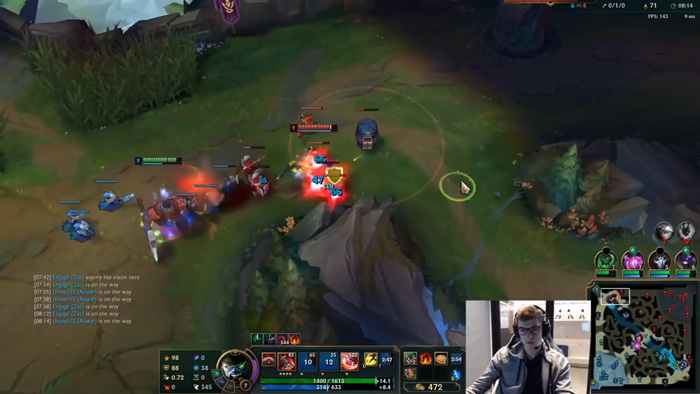
There are a lot of little moments where dances around threat zones pretty well. At about 12:15 he sees GP running up for a parrrley, hits the E slow, gets the charged q right at the tip of the hitbox, then forces GP into tower. There, he spaces another charged q just barely out of tower range. He also uses the w shield to block the parrrley damage, and then gets the shield burst damage onto GP—also just outside of tower range. In another moment, he charges his q right around GP’s barrel, zoning the GP off of it and letting him hit the barrel before the GP can.
The little micro execution tests are impressive too. He consistently shields the GP parrrleys on reaction, which isn’t easy even if it’s expected at the highest level. He’s also very good at punishing any missteps the GP does, as shown in a sequence at about 13:20 that starts with an e-slow that hits GP as he’s locked into place trying to parrrley a minion.
Then it extends into a charged q when GP tries to parrrley a barrel, which leads to a trade outside a tower that forces GP to burn ult and flee the lane. You can see in a lot of these clips that Alphari’s movement is tricky, often doubling back, away from auto-range only to turn, charge a q, and start trading again. Even if it is just a GP in NA soloqueue, the pressure is palpable.
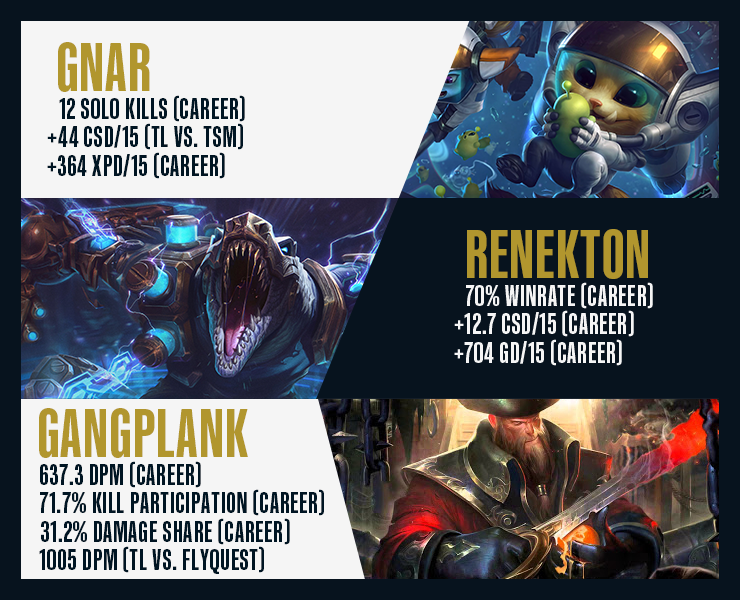
The entire VOD is also an interesting little glimpse into Alphari’s mindset as well. There are moments you can see him tilt at the discoordinated nature of NA solo queue, only to wash it off with a “whatever happens, happens” and move on to the next play. And there are moments where he weighs pressure and game state and discusses it a bit—like directly after dying to an early gank but TPing back to resume advantage.
Once you put Alphari onto a champion that really moves well, he starts to pull off this death-by-a-thousand-outplays micro game in genuine pro play. You can see this in a ton of matches but the best full match is against Licorice and Flyquest in week 4. Alphari accrues a 50 cs lead by around 14 minutes and Licorice is up a kill on him from a gank.
A subtle back breaking sequence comes at about 5 minutes in. Alphari lands a parrrley right outside tower range, autos a barrel chain before his parrrley is up and before Licorice expects it, then uses his parrrley off cooldown for another dollop of damage. Pushed to a third health, Licorice tries to force and Alphari dodges an infernal chains and all three hits of Aatrox’s darkin blade.
The raw pressure forces Josedeodo to come up and try to make something of the lane because otherwise Licorice will need to back while Alphari is 20 CS up, crashing a wave into Licorice’s turret. Santorin comes up too, Alphari dodges yet more q’s, and forces both Licorice and Josedeodo to back. Off of Josedeodo’s back, TL’s bot lane knows they can all-in and get a free 2v2 kill.
It’s one thing to see Alphari make a chump of a solo queue player. It’s another to see him do it to a player who was touted as NA’s best top lane talent for a lot of 2020.
Damage dealt, damage controlled
Even tremendous laning micro and macro does not go unpunished. To play in the way Alphari does—pressing advantages, carrying from top lane—he needs to have an innate understanding of damage control. Every player will int, and Alphari notes that in top lane, that even applies to the greats.
“TheShy obviously,” Alphari says when I ask him what top laners he watches. “I think he is a legend so I really respect how he plays even though—of course he ints. To me, that’s just part of his charm that he demands his team play around him because he is very good at it.”
In an interview I’d done with Alphari earlier, he’d said similar of Nuguri. “I think that he plays still too aggressive sometimes but I think this is just the curse of being a top laner. Sometimes you just have to int. It just seems like that’s the case—I look at TheShy, I look at Nuguri—sometimes you just can’t resist.” (Alphari also mentions Xiaohu and his odd-meta carries at length).
This is simply the nature of any sidelane once it reaches the point where a single carry has to manage the waves. There’s an inherent risk that you push too far, that you greed out for a haymaker on the other carry, and that you die for it. If you do, it’s good to know how to die somewhat gracefully.
In game 2 of the recent C9 series, Alphari starts a favorable trade on Fudge’s low-mana Sion when he realizes that his jungler is on the other side of the map and he’s now stuck between a freight train and a tiger. He dies gracefully by putting out some damage, holding his flash, and dropping an ult around where the waves meet.
The ult catches some farm and discourages Blaber and Fudge (low on mana anyways) from fast-pushing the lane. The saved flash means Alphari can still have some bravery when he returns. Santorin not only gets the dragon but the Rift Herald as well as Alphari’s still in a solid position. Later down the line, Alphari will even turn around a gank against him and get a solo kill on Perkz.
Forward presence ints will often naturally end up more controlled as well. This is because, directly afterwards the enemy needs to deal with a wave, or they may have foregone the wave for the punish. In that case, the lost minions put a bad trade of kills closer to even.
This is what happens in the 4th game of the TSM series. Alphari and company get very greedy in diving Huni’s gragas and give up a 2 for 1 on the initial play. They stick around too long to shove minions into the turret and then lose another player—3 for 1 overall.
However, the waves inherently control some of the damage as PowerOfEvil loses creeps in mid and Huni dies and loses quite a bit in terms of experience. When Alphari returns, he can still bully Huni, which plays perfectly into a Liquid comp that’s built around sidelaning. This game ends up being one of Alphari’s career bests in terms of CSD (actual career best on Gnar) and one of Huni’s career worsts overall.
Similarly, when Alphari and Santorin give over a pretty unnecessary death in game 3, Alphari’s initial damage control isn’t too bad. He makes it take a while to deny an extra creep or two but doesn’t blow flash.
The whole top lane play was sloppy but if Alphari and the team positioned and played better around the Rift herald at about 8:20, the damage from the silly death would’ve been fairly controlled. The flash Alphari saved could’ve even been used to avoid Camille’s stun had he done it purely reactively or more towards his team and out of Camille’s range.
When Alphari dies to a dive in game 1 against C9, we can also see how the idea for damage control is there but the execution falls flat. In that case, Santorin misclicks his Hecarim charge, missing the chance to at least blow Fudge’s flash, if not get a return kill.
A lot of teams in NA are actively building on counter hitting and playing smarter side lanes but it’s a work in progress for a region that is, frankly, historically bad at sidelaning. “We have some more difficulty with sidelaning sometimes than what I was used to in Europe,” Alphari notes.
Team Liquid is a bit of an interesting case where they’ve shown pretty good and pretty bad use of lane pressure just depending on the day. As Jatt’s already said, the match against C9 was not TL’s day.
Leading from the isolated lane
Part of finding the side lane success falls on Alphari’s ability not to play the lane or the map but to lead his teammates. The laning provided a strong foundation but Alphari quickly realized that he needed to build on that with communication skills.
“I’ve tried to be more of a leader and be more vocal because this is one of the main things that I took away from last year as a thing I needed to improve on. I didn’t feel like individual skill was a huge problem last year. I felt like if I wanted to improve and if I wanted to win then the lessons I could learn from last year were that I needed to look after myself a bit more, I needed to look after my teammates a bit more, and I should focus on being more of a leader and communicating better.”
“These are the main things that I’ve been really trying to focus on this year so far.”
Alphari puts this communication as core to what a top laner has to do if they expect to carry from their lane. It’s a big part of what makes taking that carry role so difficult—and what makes players like Faker, Uzi, and TheShy into legends when they pull it off.
“Of course you need to have good communication and synergy between top-mid-jungle. You need to let your jungle know what to do, you need to sync the wave timings with your mid laner so that he knows when to roam, when he knows how to cover you. [...] So a lot of it is harder to do because you need to communicate.”
“It’s pretty exhausting to do.”
Exhausting or not, Alphari feels that he communicates well and builds leads from that.
“I think early game I communicate extremely well. I think that’s one of the reasons that I’m able to get these leads because we’re able to set up these plays. Which obviously means it’s a team thing right? It means Santorin and Jensen are communicating pretty well too. So it’s all connected.”
Alphari points to the team as a whole—and to Santorin specifically—as reasons why he can excel as much as he has.
“I have a huge amount of praise to give Santorin honestly. I’m very very happy to play with him. I mean I’m happy to play with everyone on the team but he has impressed me a lot with how selfless he is and just how easy it is to play top side with him.”
“And Jensen as well. I mean obviously he is very good and he’s very flexible too and he talks well too. He roams much more than I’ve been used to. The team in general is much more selfless than any team I’ve been on—by far.”
Alphari’s intense skill radiates as much as it does because it’s supposed to. This is a team built of veterans that know the way the game communicates—and a young player with a growing sense for it. When I ask Alphari if he’s at all surprised how quickly TL began to play around him, he has another quick, frank response.
“No, not really. Because this is why they wanted me. When I was speaking to Jatt during offseason he made it clear that they wanted someone that they could play through and that they really wanted the flexibility so under my impression this was the number one priority—that I needed to be the guy that was vocal and was willing to play more counterpicks, more risky styles, build a lead.”
As far as the split’s gone, it’d be hard to say that Alphari didn’t exceed those expectations. He’s not just leading top laners in most relevant statistics, he’s nearly leading all players. 1st in KDA, 1st in GD10, 5th in DPM, and 6th in damage share across the league—all as a top laner.
But to Alphari all of this doesn’t amount to that much—and with good reason. He’s heard the praise before, he’s been the lane king before, but he’s still waiting on getting his split win—not just the Lock-In. After an ugly 3-1 loss to C9 in a series most expected them to win, Liquid has work to do. That work is all Alphari is really concerned with.
“The past three months don’t matter. Whether we win or lose this weekend will define if this split was worth it or not.”
Bad habits, off days, and endurance
“Sorry, I didn’t mean to interrupt. I do that. It’s a bad habit of mine, my brain just can’t keep up sometimes.” Alphari apologizes after interjecting to add onto one of his prior answers.
For a League player, I imagine any bad communicative habit has to stick out. So much of the true work done over a split comes in conversation both in and out of game, each role needing to lead and support to certain extents. The whole interview is interesting in the way that it’s clearly another communicative responsibility.
One that Alphari tries his best at too. He sits down with me at the end of scrim block and he apologies later as well for any rambling or lack of energy. He is drained.
“I’ll try to be honest,” he says, when I ask him how he’s feeling. “A lot of the time I’m feeling tired because I’m working very hard and the split has been non-stop. It’s a problem sometimes. Some days I feel like it’s more intense than normal and it feels really shitty and I start getting stuck in my own head. But a lot of the times I’m feeling happy and motivated and feeling like, ‘Yep, I’m doing what I want to be doing. This is fine. Life is good.’”
“But I just try to keep the mindset that winning is the most important thing right now.”
Knowing how much League players put in—even in the west where the regimen is considered more relaxed—you understand the sport is about endurance as much as anything else. In turn, you gain a respect for the athletes that continually seem to endure. Perkz and Jensen being great examples each in their own way (there are of course many others too).
Perkz for always rising to the occasion in playoffs and for elevating his teams. Jensen for having an insanely high floor to his abilities—rarely ever falling off hard even on the off days and bad stretches.
As Alphari comes into TL, he seeks to be that kind of player too—changing habits to cut down on the off days and build up the mental endurance.
“One of the problems I’ve identified in myself has been that a lot of scrims I’m giving quite a lot of energy for the first 3 or 4 games and then I’m feeling very tired, very exhausted. It’s hard to overcome this fatigue for the 5th game. I have ideas about what I can do to improve this, I think it’s a lot about building good routines.”
“When you have to talk so much when you play, when you have to really think during reviews, when you have to prepare... And the schedule, there’s very little breaks, there’s like one off day and even this is not really an off day most of the time, and this is like 3 or 4 months in a row. It’s very much about keeping the day-to-day consistent and disciplined and just trying to optimize it.”
It strikes me that when speaking on the intangibles, a lot of readers, players, and fans, don’t understand how meaningful these things are because they can’t grab you and shake you like a 40 CS lead at 15 minutes does. But if you watched the series against C9, you should be able to see these intangibles. You should be able to see the fatigue, the frustration, the weight of a long journey.
Take game 4, about 4 and half minutes, where Alphari decisively outplays Fudge in lane. He walks straight at Fudge’s Sion, enticing the OCE top lane to fully charge a q. He avoids the q knockup range about as perfectly as possible and closes in for a very nice trade. This not only forces Fudge to back but let’s Alphari proxy the wave, ballooning his CS lead from +5 to +17.
On the bottom side, TL is getting a drake and scales well given Orianna, Jinx, and Tahm Kench. Alphari uses the time he buys with his proxy to pressure the mid lane—a lot like what he did in that week 4 game against C9. And this play works again. He slices in and gets a flash off of Perkz. It’s a flash that will be down in time for Rift Herald and that TL will abuse to kill Perkz and get the objective.
It’s a completely won play at that point. But then Alphari flashes in, under tower, not quite killing Perkz and dying himself. This play is rough because there isn’t a ton of damage control. Fudge is pushing the top wave in as Alphari dives. The CSD resets back to +3 and Fudge gains a level advantage. If Alphari walks or TPs to lane after getting the flash, he keeps his own flash, keeps his lane advantage, and the entire game looks different.
This is not an exaggeration.
To me, the botched dive reads as a tired play. A play that happens when you’re staring down needing to win two games in a row against a good opponent and it’d be nice to just break everything open. It’s far from only Alphari either. The whole game reads like a 5th scrim at the end of a long block.
Santorin—a jungler known for his great pathing and strong read on the mid-game—is out of position and out of sync in major fights. Jensen is whiffing important abilities. TL’s bot lane struggles to make a mark—a rarity especially for CoreJJ. And of course there are more complex arguments to be made about the draft too.
Most teams in NA are still beatable despite these mistakes. Even TSM will make larger mistakes than these, fundamentally cancelling them out. But Cloud9 is not beatable with these mistakes. History shows most Perkz-led teams aren’t.
Coming out of the series, this is why Jatt feels the team played poorly and why many players in the series marked it below their caliber. There is a reasonable argument that the team has a higher ceiling than this. However, there’s another reasonable argument that’s all the more worrisome:
Staring down two sets against two of NA’s best teams in one weekend, Liquid could run out of gas.
It’s a fear that looms now especially, with the announcement that Santorin will miss the TSM series due to physically debilitating migraines. It’s something that Alphari has seen before with his now Strategic Coach, then jungler Kold. After a long, exhausting stretch of League, Kold had to sub himself out of Origen’s gauntlet run due to migraines that made him bed-ridden. (It’s a nightmare-scenario for any player so please be kind to and send well-wishes to Santorin).
Even still, this is a team with a lot of adaptable veterans and a lot of resources at hand—including a solid backup in Armao, a jungler that the team has worked with and won with before. The question is if the team can still do it. Anyone who has faced down burnout and fatigue knows that sometimes you don’t. Sometimes you lose.
But for Alphari especially, there’s a certain magic to this moment—the possibility that he rises to it. Eye to eye with the best western player in history, TSM still in the path, leading from the isolated lane without Santorin, this is not an easy split to win.
For Alphari, get it done. And it’s your split. MVP be damned.
Writer // Austin R. Ryan
Graphics // Zack Kiesewetter








